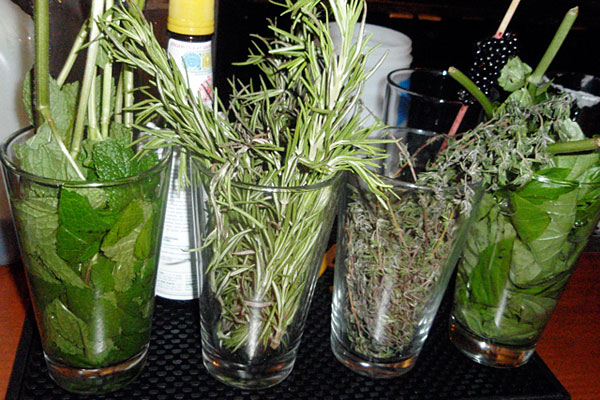I knew I’d feel right at home in a bar called Farmhouse since I grew up in a house on a farm myself. Yes, my family’s farmhouse was in the middle of a field with a frog pond off to the side, while Farmhouse, the “Midwestern craft tavern,” is on Chicago Avenue with an L stop off to the side, but there had to be similarities, right?…

While Midwestern beer is the star at Farmhouse, with 24 varieties on tap, the bar also offers herbaceous cocktails designed by Adam Seger. Above, fixings stand at the ready. See more photos below, including pics of the Chaser’s own Kentucky farmstead.
I knew I’d feel right at home in a bar called Farmhouse since I grew up in a house on a farm myself. Yes, my family’s farmhouse was in the middle of a field with a frog pond off to the side, while Farmhouse, the “Midwestern craft tavern,” is on Chicago Avenue with an L stop off to the side, but there had to be similarities, right?
Spider web in the doorframe? Check. (Fake, I thought, snapping a photo.) Pitchfork leaning on something? Check. (My grandmother made handy use of pitchforks in her garden back home, using them to stab snakes and fling them, still writhing, over the fence row.) Massive piece of ancient, unidentifiable, unmovable metal equipment? Check. (More on this later. Also, ask my dad about our Oliver tractor.)
Not since Babe: Pig in the City has there been such a widespread urge to incorporate barnyard culture into urban living. I don’t have to tell you what I mean; you know you tried and failed to grow bushels of tomatoes in your Topsy Turvy two summers running. So it was no surprise that after work yesterday, I spied a herd of people who looked like they desperately wished they were on a farm—but seemed content not to spend another happy hour at one of River North’s many big box bars—pouring into the week-and-a-half-old Farmhouse.
I waved off a Bob-Evans-friendly hostess at the door in my rush to grab the last two available seats. In a lineup of mix-and-match stools, I was pleased to find these both had backs; one even had arms. I put my good farm-kid manners to work and politely saved it for my friend Jenny.
As the story goes, the owners of Farmhouse first tried to buy the thriving Andersonville beer bar Hopleaf from its owner, Michael Roper, who declined the offer on the grounds that he’s still having too much fun. But the Farmhouse team—two Irish husband-and-wife duos, Ferdia and Nora Doherty and TJ and Molly Callahan—still wanted to focus on beer, and they vowed the last thing they’d do would be to foist another Irish bar on Chicago.
So, from a clipboard menu, I chose a Dark Horse Raspberry Ale ($6), which, I learned, comes from 139 miles away in Michigan. “If it’s not from the Midwest, we consider it an import,” Ferdia told me later; Farmhouse carries 24 Midwestern beers on tap. Jenny, however, does not like beer—Stop! She doesn’t want to hear it from you or anyone!—so she ordered her standard, a vodka soda ($8, made with Lake Bluff’s own North Shore vodka).
“I received zero ’tude for my vodka request,” noted Jenny, happy not to have been chided by a beer-happy bartender. We looked around and decided we liked the feel of the long, narrow room with its booths tucked away between stained-glass partitions (the glass came from the now-shuttered Charlie’s Ale House in Lincoln Park), a homey farm-themed mural by the artist Peter Hurley, and a rough-hewn bar top made from wood out of an old factory on the South Side.
It soon became clear that the group of people perched immediately to our right was the owners, so I asked Ferdia about the massive piece of equipment behind the bar, which reminded me of our abandoned corn silo back home.
“That’s our Bevador,” he said proudly. The Bevador is a lazy-Susan-style refrigerator from the 1930s, and it holds 500 bottles of beer. “We found it in a mechanic’s garage on the South Side, and it took eight people to carry it in here. It weighs a thousand pounds.”
“Oh, by the way, I really like your cobweb outside!” I told him.
“What cobweb?”
“You know, your big fake cobweb in the door?”
The cobweb, it turned out, was 100 percent authentic, and just as I feared Ferdia was on his way to knock it down, Jenny diverted him with a story.
“My mom told me the most touching thing,” Jenny said. “I guess E. B. White was doing a book-on-tape reading of Charlotte’s Web, and he had to keep rerecording it, over and over and over. Every time he got to the part where Charlotte died, he cried. Every time.”
“His own book!” I said.
“Well, he was overcome,” Jenny explained. “It is a pretty big deal when Charlotte kicks the bucket.”
With that, we ordered another round. Sad things happen on farms sometimes, but at least this was one spider we could save.


